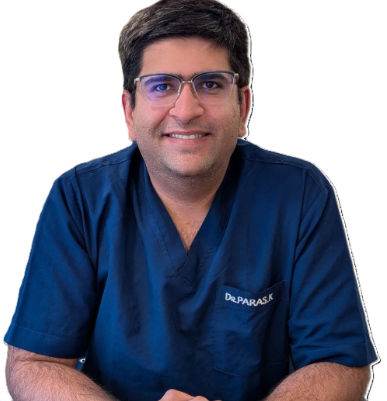Is Lasik Surgery Safe? - Success Rate, Dangerous or Not

Quick Summary
- LASIK surgery is a safe and effective procedure for correcting refractive errors
- The surgery involves using a laser to reshape the cornea, which is the clear front part of the eye
- LASIK is a minimally invasive procedure with a high success rate
Table of Contents
- How safe is LASIK eye surgery?
- The success rate of LASIK surgery
- Factor Affecting the Safety of LASIK Surgery
- Side effects of LASIK
- What are the benefits of LASIK surgery, making it a safe procedure?
- Things to do after LASIK
- Things that are to be avoided after LASIK surgery
- Takeaway
- Frequently Asked Questions
- References
Despite being one of the most successful interventions in treating refractive errors, certain patients still have a question in mind, is LASIK surgery safe or not. However, LASIK surgery is one of the most widely used surgeries to address and correct refractive errors. Laser eye surgery, also known as LASIK (laser in-situ keratomileusis), is a highly advanced and popular surgical procedure. It can effectively treat conditions such as nearsightedness (myopia), farsightedness (hyperopia), and astigmatism.
The surgery involves using a laser to reshape the cornea under the supervision of an eye surgeon. With minimum side effects and great success rates LASIK is a safe surgical procedure widely used by doctors for vision correction.
How safe is LASIK eye surgery?
One of the most common concerns of a patient thinking about getting LASIK surgery done is LASIK eye surgery safe or not. However, LASIK surgery is widely preferred by patients looking for vision correction. This is because not only does LASIK surgery produce successful outcomes, but it also has very few side effects associated with it, making LASIK a safe procedure for anyone who want to correct their vision.
Although LASIK is a safe procedure, there are various factors that are taken into consideration by the doctor before choosing this procedure.


The success rate of LASIK surgery
The success rate of LASIK surgery is 96%, indicating it is quite safe. According to the American Society for Cataract and Refractive Surgery, over 90% of patients experience 20/20 vision post-LASIK surgery, and nearly 100% patients obtain vision that is better than 20/40.
Who is an ideal candidate for LASIK surgery?
Before prescribing LASIK surgery, the doctor will check if the patient is a suitable candidate and also how safe is LASIK laser eye surgery for them. This is because, many a time, patient related factors may impact the outcome of the surgery. Hence, to ensure that LASIK is safe for the patient and produces successful outcomes, it is important to determine who is the ideal candidate. The general criteria that a patient planning to undergo LASIK eye surgery must meet include the following,
- To achieve safe LASIK surgery results, the candidate must not have certain health problems such as immune system diseases or diabetes.
- The patient must not be taking any medicines that can compromise the immune system, such as immunosuppressants.
- It is not known how safe LASIK surgery is during pregnancy. Additionally, hormonal changes during pregnancy can affect the stability of a woman's vision, which could affect the outcomes of LASIK surgery. Hence, it is advised for pregnant women to wait until after the pregnancy period is over before they undergo LASIK surgery.
- LASIK may not be safe for patients having eye problems as it may affect the healing process after the surgery. Hence, the patient must be free from eye problems like strabismus, glaucoma, keratoconus, dry eyes or amblyopia.
- LASIK surgery is safe only when done in patients above 18. However, in some cases, the doctors advise the patient to put the surgery on hold until they reach the age where their eyes have matured, which may be when they turn 21.
- For the patient to be an ideal patient, they must have a stable vision for at least 12 months. Noticing changes in the prescription for corrective eyewear could mean that your corneas are changing. As a result, the outcomes of LASIK surgery may not last very long.
Factor Affecting the Safety of LASIK Surgery
Just like any other surgical procedure, LASIK surgery is also affected by several factors. These factors are important to be considered while determining The safety of LASIK surgery.
Is lasik surgery safe or not depends on several factors, such as,
- Patient-related factors: In order to maximise the safety of LASIK and get successful results, the patient needs to be an ideal candidate.
- Preoperative testing: Comprehensive eye exams, such as corneal topography, wavefront analysis, and measuring the thickness and shape of the cornea, can help identify any potential issues or contraindications for LASIK.
- Additionally, the doctor may also check the patient’s past surgical history, personal history and family history before LASIK surgery.
- Surgeon experience and skill: The experience and skill of the LASIK surgeon performing the procedure are essential factors in ensuring the safety and success of the surgery. Choosing a trained and experienced surgeon with LASIK and up-to-date technology can improve the chances of a successful outcome.
- Technology and equipment: Advances in LASIK technology have improved the accuracy of the procedure and have made LASIK safer.
- Postoperative care: Proper postoperative care, including the use of prescribed medications, avoiding certain activities, and attending follow-up visits with the surgeon, can help prevent complications and ensure the best possible outcome.
Side effects of LASIK
Like any surgical procedure, LASIK (Laser-Assisted in Situ Keratomileusis) carries the risk of potential side effects. These side effects are mostly temporary and will resolve in a few weeks. Rarey, LASIK may cause loss of vision in the patient. The various risks of LASIK eye surgery include the following,
- Dry eyes: This is a very common side effect that can last for several weeks or for around six months after the surgery. This is because LASIK may cause a decrease in the production of tears. Artificial tears and other treatments can help alleviate the symptoms.
- Glare and halos: Some patients may experience glare, halos, or other visual disturbances, especially at night. These symptoms usually improve over time.
- Undercorrection or overcorrection: Certain patients may feel LASIK is unsafe due to the risk of under-correction or overcorrection. Sometimes, the desired outcome of LASIK may not be achieved, resulting in an under-correction or overcorrection of the refractive error.
- Undercorrection occurs when a laser removes very little tissue from the eye. Overcorrection occurs when a laser removes too much tissue from the eye.
- Flap complications: When the flap is folded back or removed from the front portion of the eye during surgery, a flap problem may arise. This problem may cause complications such as infection, inflammation, or detachment.
- Astigmatism: Uneven tissue removal during the surgery may cause astigmatism, which may require another surgery or glasses.
What are the benefits of LASIK surgery, making it a safe procedure?
LASIK is a safe procedure with several benefits, making it an ideal choice for people with refractive errors. The various benefits of LASIK include the following,
- LASIK surgery is painless.
- The procedure typically takes less than half an hour to complete.
- The vision correction achieved by LASIK is usually permanent.
- LASIK can eliminate the need for glasses or contact lenses.
- If there are any changes to the patient's vision over time, the doctor can adjust as needed.
Things to do after LASIK
There are certain practices to be exercised after LASIK surgery to ensure the eyes' safety, prevent pain occurrence and ensure quick healing. In some cases, the patient may recover within 6 to 12 hours after the surgery, whereas, in certain cases, it may take about 3-5 days to recover. However, with proper care post surgery after surgery, the patient may recover quickly. The tips to follow after LASIK include the following,
- Wearing the protective shield while sleeping for about 7 days after the procedure
- Getting adequate rest during the recovery period
- Wearing glasses or sunglasses to protect the eyes from dust, smoke, and sunlight
- Scheduling follow-up appointments with the doctor for check-ups, typically for around six months after the procedure
- Immediately inform the doctor and seek medical help if there is severe pain after LASIK surgery.
Things that are to be avoided after LASIK surgery
Certain things are to be avoided after LASIK surgery as they may be unsafe and dangerous. These things include the following,
- Avoid rubbing your eyes to try to improve your vision
- Don't use any cosmetics or other products that could irritate your eyes without your doctor's approval
- If you experience any vision problems after the laser surgery, it's essential to consult your doctor rather than resort to your old contact lenses.
- Refrain from going to hot tubs or swimming pools for approximately two months, and check with your doctor before engaging in sports activities.
- One should avoid driving at night for the first month after laser surgery.
Takeaway
By now, you must have known is Lasik surgery safe or not. LASIK eye surgery has become popular over the years due to its exceptional results in vision correction. Although it is a safe, effective and one of the most commonly used surgeries, some people still believe LASIK is dangerous and hesitate to get it done. However, LASIK is safe and produces good results in most patients. In order to get LASIK surgery done, it is essential to get a preoperative assessment done by the doctor to ensure you are an ideal candidate for the surgery.
At HexaHealth, we understand that having a clear vision is essential for daily activities. That's why we provide the best affordable LASIK surgery to our patients. Our team of excellent doctors with years of experience performing LASIK surgeries use the best technology to ensure a safe and successful procedure. At HexaHealth, we are committed to providing our patients with the highest quality of care.
Suggested Reads:
Frequently Asked Questions
Is LASIK surgery safe?
Yes, LASIK surgery is a safe and effective procedure for treating vision problems such as nearsightedness, farsightedness and astigmatism. However, discussing the risks and benefits of LASIK surgery with your eye doctor is essential and ensuring that you are a good candidate for the procedure before getting it done.
What factors decide how safe is LASIK laser eye surgery?
There are various factors governing how safe LASIK is. These factors include the following:
- Patient-related factors
- Preoperative testing
- Surgeon experience and skill
- Technology and equipment
- Postoperative care
Can LASIK surgery damage your eye?
In most cases, LASIK surgery is a safe and effective procedure to treat refractive errors. However, in rare cases, LASIK surgery may cause eye complications and damage, ultimately causing vision loss.
At what age is LASIK eye surgery safe?
Is LASIK dangerous?
No, LASIK is not dangerous. LASIK is a safe surgical procedure. However, as with any surgical procedure, there are some risks and potential complications associated with LASIK surgery.
Which LASIK eye surgery is safest?
The standard LASIK eye surgery is the safest eye procedure, as the risk of complications is low with this surgery. However, every surgery has some risk of side effects associated with it.
Is LASIK 100% safe?
No medical procedure can be considered 100% safe, including LASIK surgery. However, LASIK is generally considered a safe and effective procedure, with a high success rate and a low risk of serious complications. The risk of complications associated with LASIK eye surgery is less than 1%.
Does LASIK permanently fix eyes?
Can a LASIK surgery fail?
Although LASIK is a safe and highly effective procedure, in rare cases, the surgery may fail. This may lead to loss of vision. However, according to studies, the chance of failure or severe complications of LASIK surgery is less than 1%.
What precautions should I take to avoid the side effects of Lasik surgery?
The precautions you should take to avoid side effects of LASIK surgery include the following:
- Adequate rest is to be taken.
- A protective shield should be worn for the first four nights after the LASIK surgery.
- Wearing sunglasses following LASIK surgery
- Taking the medications and eye drops prescribed by their doctor after their LASIK surgery
- Rubbing the eyes is to be strictly avoided.
- Driving, exercising and wearing makeup must be avoided until the doctor says it is okay to do so
- Refrain from taking hair showers or washing their heads.
What factors decide how safe is LASIK laser eye surgery?
There are various factors governing how safe LASIK is. These factors include the following:
- Patient-related factors
- Preoperative testing
- Surgeon experience and skill
- Technology and equipment
- Postoperative care
Can LASIK surgery damage your eye?
In most cases, LASIK surgery is a safe and effective procedure to treat refractive errors. However, in rare cases, LASIK surgery may cause eye complications and damage, ultimately causing vision loss.
At what age is LASIK eye surgery safe?
Is LASIK dangerous?
No, LASIK is not dangerous. LASIK is a safe surgical procedure. However, as with any surgical procedure, there are some risks and potential complications associated with LASIK surgery.
Which LASIK eye surgery is safest?
The standard LASIK eye surgery is the safest eye procedure, as the risk of complications is low with this surgery. However, every surgery has some risk of side effects associated with it.
Is LASIK 100% safe?
No medical procedure can be considered 100% safe, including LASIK surgery. However, LASIK is generally considered a safe and effective procedure, with a high success rate and a low risk of serious complications. The risk of complications associated with LASIK eye surgery is less than 1%.
Does LASIK permanently fix eyes?
Can a LASIK surgery fail?
Although LASIK is a safe and highly effective procedure, in rare cases, the surgery may fail. This may lead to loss of vision. However, according to studies, the chance of failure or severe complications of LASIK surgery is less than 1%.
What precautions should I take to avoid the side effects of Lasik surgery?
The precautions you should take to avoid side effects of LASIK surgery include the following:
- Adequate rest is to be taken.
- A protective shield should be worn for the first four nights after the LASIK surgery.
- Wearing sunglasses following LASIK surgery
- Taking the medications and eye drops prescribed by their doctor after their LASIK surgery
- Rubbing the eyes is to be strictly avoided.
- Driving, exercising and wearing makeup must be avoided until the doctor says it is okay to do so
- Refrain from taking hair showers or washing their heads.
Last Updated on: 9 March 2023
Reviewer

Dr. Aman Priya Khanna
MBBS, DNB General Surgery, FMAS, FIAGES, FALS Bariatric, MNAMS General Surgery
13 Years Experience
Dr Aman Priya Khanna is a highly experienced and National Board–Certified Laparoscopic, GI, and Bariatric Surgeon with over 13 years of clinical expertise.
He is widely regarded as one of the best bariatric surgeons in Ahmedabad, ...View More
Author

She is an accomplished new-age professional who has interviewed prominent personalities such as Bhaichung Bhutia, G. Sathiyan, Shashi Tharoor, etc. A content writer interested in health communication, graphic desi...View More
Expert Doctors (10)
NABH Accredited Hospitals (5)
Latest Health Articles
Related Treatments
























 Open In App
Open In App